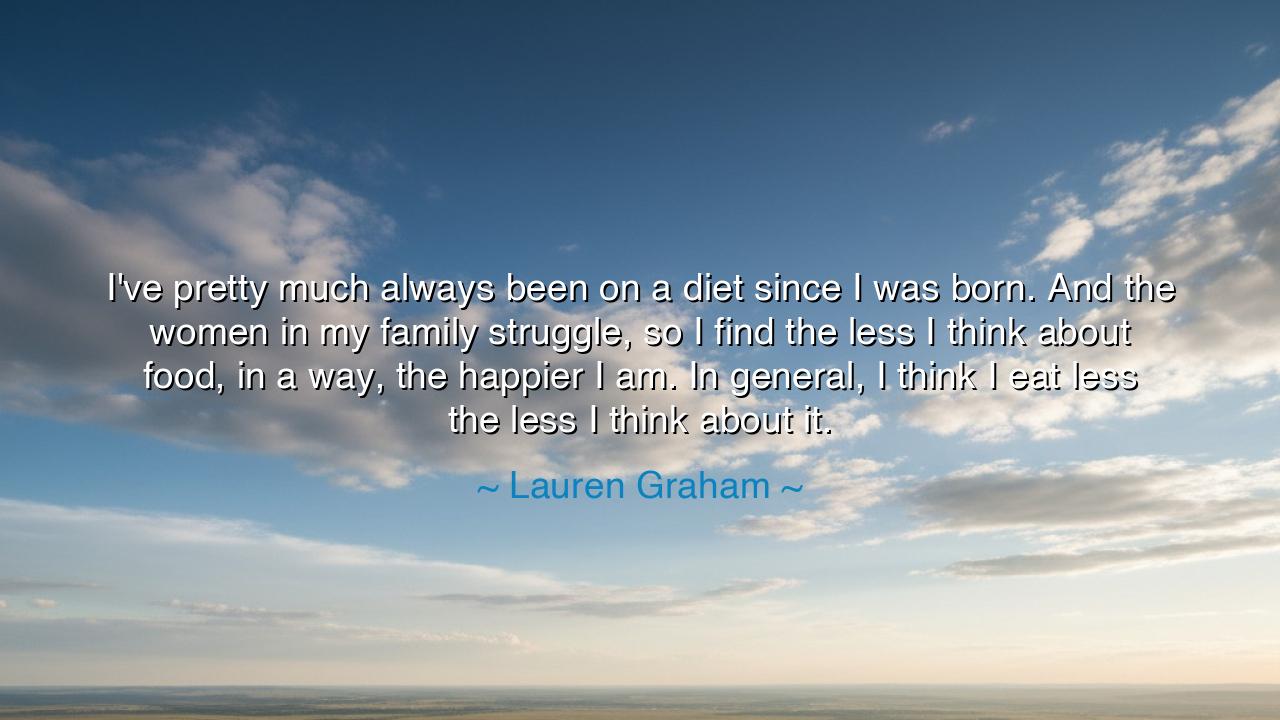
I've pretty much always been on a diet since I was born. And the
I've pretty much always been on a diet since I was born. And the women in my family struggle, so I find the less I think about food, in a way, the happier I am. In general, I think I eat less the less I think about it.






In the words of Lauren Graham, “I’ve pretty much always been on a diet since I was born. And the women in my family struggle, so I find the less I think about food, in a way, the happier I am. In general, I think I eat less the less I think about it,” there lies not a mere reflection on eating, but a profound lament on the burdens of thought, the weight of self-judgment that presses upon generations. Her words, though simple in tone, rise from the deep river of human experience—the eternal battle between mind and desire, between what we long for and what we deny. It is the voice of one who has grown weary of obsession and has discovered, through trial, that peace begins not in control, but in letting go.
To say “I’ve pretty much always been on a diet since I was born” is to speak of a life lived under the shadow of constant measurement—each bite counted, each reflection examined, each joy weighed against guilt. Yet behind this confession is not vanity, but vulnerability. The ancients, too, knew this struggle, though they spoke of it in different words. The philosophers of Greece and the sages of the East warned that fixation breeds suffering—that the more one clings to thought, the farther one drifts from harmony. In her realization that happiness grows when attention softens, Graham touches an ancient truth: what we release, ceases to rule us.
The struggle she names—“the women in my family struggle”—is a lineage of longing that many inherit. Across time and culture, the body has been both a temple and a battlefield. Women, especially, have carried the burden of expectation, taught to treat nourishment as both necessity and sin. Yet there were women of old—Spartan mothers, Roman matrons, Zen priestesses—who reclaimed their strength not by denial, but by balance. They understood that mastery is not born of war against the self, but of friendship with it. To be free from obsession is not to abandon discipline, but to rise above it, as the eagle soars higher than the storm that once bound it to the wind.
Consider the tale of Diogenes, the philosopher who lived in a barrel, owning nothing, fearing nothing. He ate when hungry and rested when tired. To him, freedom was found in simplicity—in not being owned by possessions, cravings, or fears. His wisdom was not gluttony nor starvation, but a state of calm awareness. Like him, Lauren Graham speaks to a modern captivity—the captivity of constant self-surveillance. Her words remind us that liberation begins when the chains of overthinking fall away, when the mind stops circling the same hunger and turns toward the light of living.
In her reflection—“the less I think about food, the happier I am”—we hear a principle as old as the Stoics: peace belongs to those who master attention. The mind, when unquiet, magnifies every appetite; but when stilled, desire loses its dominion. The ancients compared this to water—disturbed, it distorts all images; at rest, it reflects the heavens. When we cease to obsess, the body remembers its natural rhythm, and life returns to its rightful flow. To think less is not to care less—it is to trust more deeply, to live from instinct rather than anxiety.
And so, Graham’s wisdom becomes a quiet anthem for all who have struggled with the weight of self-control. She teaches not rebellion against structure, but release from obsession. The disciplined life is noble, but when discipline turns into self-punishment, joy withers. True mastery is gentle—it allows the heart to breathe. The wise of old knew this balance: eat with gratitude, rest with peace, move with purpose, and think no more than is needed. In such a life, there is room for laughter, for lightness, for love.
Let this lesson be passed down like an ancient scroll: do not let your thoughts become your captors. In every aspect of life—whether food, ambition, or desire—seek not domination, but harmony. When the mind grows still, the body finds its rhythm; when the heart grows calm, life becomes its own nourishment. To think less is not to live carelessly—it is to live freely.
Thus, remember the teaching hidden in Lauren Graham’s words: that happiness is not found in constant calculation, but in trust—in releasing the grip of control and allowing life to flow through you as the wind moves through the trees. Eat when you are hungry, rest when you are weary, and let joy—not judgment—be your guide. For the one who learns to let go of thought returns to the ancient art of living simply, and in that simplicity, finds both peace and strength eternal.






AAdministratorAdministrator
Welcome, honored guests. Please leave a comment, we will respond soon